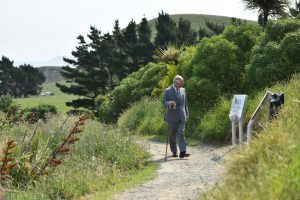HRH Prince Charles visited our Ta Rae O Atiu colony on the Kaikoura peninsula where he met our patron Geoff and family, many of our trustees, Rawiri representing Te Runanga o Kaikoura and the star of the show – our Titi.
HRH meets Ted, Geoff, Phil and Rawiri as Chair, Patron, DOC and Runanga representative.
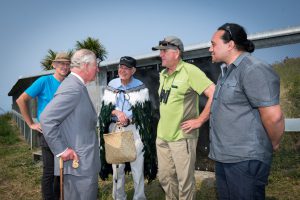
KAIKOURA, NEW ZEALAND – November 23: Prince of Wales at the Hutton’s Shearwater November 23, 2019 Kaikoura, New Zealand. (Photo by Mark Tantrum/ http://marktantrum.com)
HRH the Prince of Wales (PoW) then walked into the site and met some of the team.
Meeting Teri.
From left – Rawiri, Geoff, Ted, Phil, PoW, Teri, Nicky, Sheryl (foreground), Lorna (background), and Geoff’s family Lindsey, Belinda, Emma, Brenda, Steve and Paul (Ailsa out of frame taking photos).
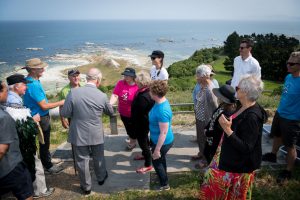
KAIKOURA, NEW ZEALAND – November 23: Prince of Wales at the Hutton’s Shearwater November 23, 2019 Kaikoura, New Zealand. (Photo by Mark Tantrum/ http://marktantrum.com)
Geoff then presented a kete of gifts including Richard’s book to the PoW.
PoW receives Kete from Trust. From left – Ailsa, Ted, Phil, Geoff, Teri, PoW, Lorna, Nicky, Belinda, Steve, Lindsey, Rawiri (partially).
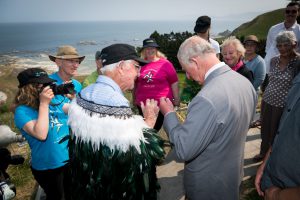
KAIKOURA, NEW ZEALAND – November 23: Prince of Wales at the Hutton’s Shearwater November 23, 2019 Kaikoura, New Zealand. (Photo by Mark Tantrum/ http://marktantrum.com)
The prince also met a very stroppy bird from burrow 12 that was not at all pleased at being disturbed and took out its displeasure on chair Ted.
From left Nicky, Rawiri, Geoff, Phil, PoW, Titi from burrow 12 and Ted.
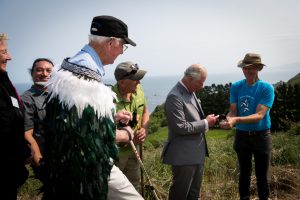
KAIKOURA, NEW ZEALAND – November 23: Prince of Wales at the Hutton’s Shearwater November 23, 2019 Kaikoura, New Zealand. (Photo by Mark Tantrum/ http://marktantrum.com)
In the 20 minutes HRH spent on site he was given a brief introduction to the bird, and its endangered status. The need for advanced monitoring equipment to allow us to detect any threat to the few remaining colonies was stressed. He seemed genuinely interested in individuals, humanity and nature.
He then left the site for a walk along the cliff tops past Sam’s bronze of our Titi.
The prince later narrated a video about his concern at where our current economic system is taking us, and how we might choose another path. His visit to Te Rae o Atiu features towards the end of the video.
What he says is:
“The tragedy of our recent past, it seems to me, is that we have come to view human achievement in terms of our ability to defeat nature. To defy the limitations she imposes on us and to demonstrate our own supremacy, as a species, over the natural economy she requires. Now in all of this we could do well to recall the belief of many indigenous peoples around the world that in making decisions we should think about the consequences for unborn children seven generations in the future.
It would be worth bearing in mind the Maori principle of kaitiakitanga which holds that we are intrinsically connected to the natural environment and that it is beholden on us to treat it with care, guardianship and good management.
If, ladies and gentlemen, we can find a place for this traditional wisdom at the heart of a new decarbonised and circular bio-economy; if we can turn back to nature with reverence and respect and recognise that we are utterly dependent upon her; and if we realise that our economy must be informed by Nature’s own waste free circular economy; then we can still change course.”

